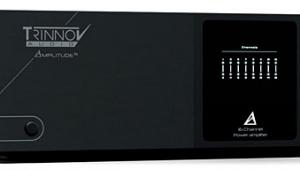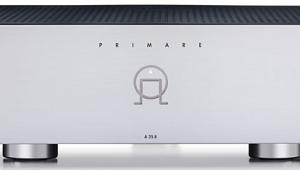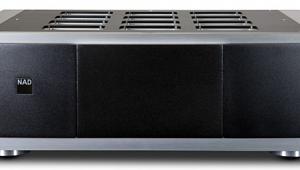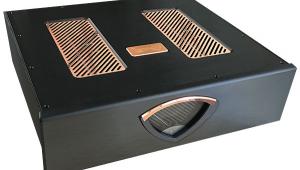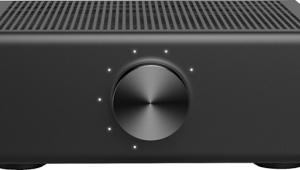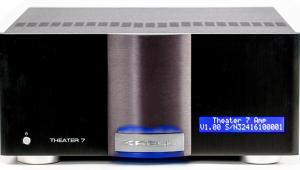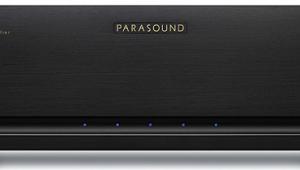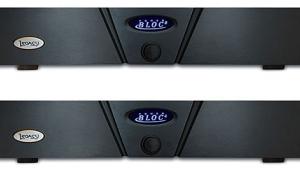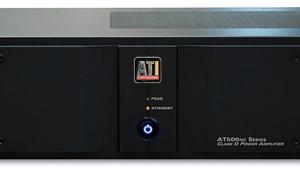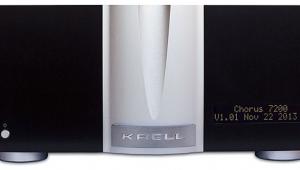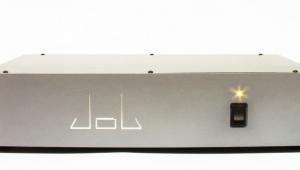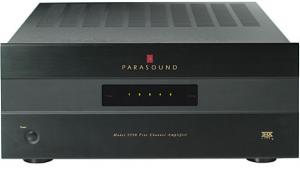Theta Citadel Monoblock Amplifiers: Short Take
- Price: $15,800/pr.
- Channels/Power: Monoblock; 400-Watts per channel into 8 ohms/650-Watts into 4 ohms
- Inputs: Single-ended and balanced

Theta's Dreadnaught amplifier represented something of a sea change in multichannel power amplifiers. Although a number of high-end audio companies had already released amps, Theta's Dreadnuaght was very different in design and sound. It was a fully balanced, zero-feedback design in which each powerful mono channel was really a bridged stereo pair. Never mind that the Dreadnaught represented a completely new level of performance for home theater amps, in many ways it set new standards for solid-state amplification in any configuration.
Realizing it had something far beyond the traditional multichannel amplifier already, Theta set out to make a statement amplifier based on the Dreadnaught's circuit design, and thus was born the Citadel monoblock. The Citadel is a reference quality amp with the looks and the price tag ($15,800/pr.) to match, and a flagship component in every way.
And I suppose I should admit up front that I'm a member of this here club: I bought a pair of Theta Citadel monoblocks and a Dreadnaught to use in my own reference system. The Citadels and a three-channel Dreadnaught are how I power the five channels of audio in my system. You'll detect some serious pride of ownership here!
Outside and In
The Citadel is simply one of the most stately and imposing components I've ever had in my theater, and while they come in silver and black the latter was my choice for its dark, silky texture. While most amps are things you want to hide away in a closet, the Citadel is something you'll want everyone to see, as close to industrial art as hi-fi gets. And don't forget there are performances advantages too. Placing a monoblock right next to your speaker allows very short speaker wires, and you can hear every inch of speaker wire you put I your system.
The winged Theta logo on the extruded piece that sits on the Citadel's front is the power button, and around back there are single-ended and balanced inputs and massive screw-down terminals that require an included tool to use. They might be a pain, but they sure as hell lock spade lugs down tight. In addition to an AC inlet and a main "analog" power button, there's also an empty expansion bay, and a currently defunct "digital" power button. Thetat might one day throw a DAC section in there, a la Meridian, providing a direct digital connection from a transport/preamp.
The main circuit design for the Dreadnuaght, and therefore the Citadel, was by Ayre's Charles Hansen. Jim White, now of Asesthetix, used to have a day job at Theta and worked on these amps at Theta's end along with Dave Reich, Theta's current General Manager and Chief Designer. Dave has worked for high-end stalwarts such as Classe and McCormack, and is responsible for a number of respected designs from those companies. In other words, these amps have serious high-end pedigree in design talent.
The Citadel is a zero global feedback amp, with a fully balanced, differential topology. Although a mono amp, in configuration it's a bridged stereo module at its heart. While Citadel is based on the Dreadnaught, with JEFTs at the input and sixteen bipoolars at the output section, hand-tweaked, upgraded parts are used throughout, the power supply is much larger for a single channel, and choke filtering is used to quench noise and blacken the backgrounds even further.
Sound
In my years of reviewing, Theta's Citadels are the best amps I've heard, period. They offer the liquidity, delicacy and solidity and organization in imaging of the finest tube amps, but they have the reliability, raw power and bass control of the best solid-state designs. This is a powerful, and in my experience unsurpassed combination of performance attributes to someone like me who demands uncompromised musical performance in a system that pulls double duty for home theater.
Writing up everything the Citadel does well would take more space than a "Short Take" allows, so let me simply say that this amp has no discernible weaknesses. It's incredibly powerful, and the only amps I've heard that better is bass performance are switch-mode amps that were crushed by the Citadel in all other regards. Music and sound effects merely happen in space from backgrounds are as black as night. The imaging is palpable, holographic and dimensional with see-through transparency and gobs of inner detail, and yet the sound is as non-mechanical and natural as any tube amp I've heard. It doesn't call attention to itself or push anything forward to the listener. Layers upon layers of depth and resolution simply flow into the room, with weight and foundation on the bottom, silky air and extension on top, and everything in between in its right place. This is one of the rare amps that take you far beyond the recording itself and into the very recording space.
Theta's Citadel is a monumental achievement in solid-state amplifier performance and aesthetic design. It's what every flagship aspires to be: the best in its class.
- Log in or register to post comments
